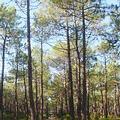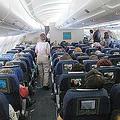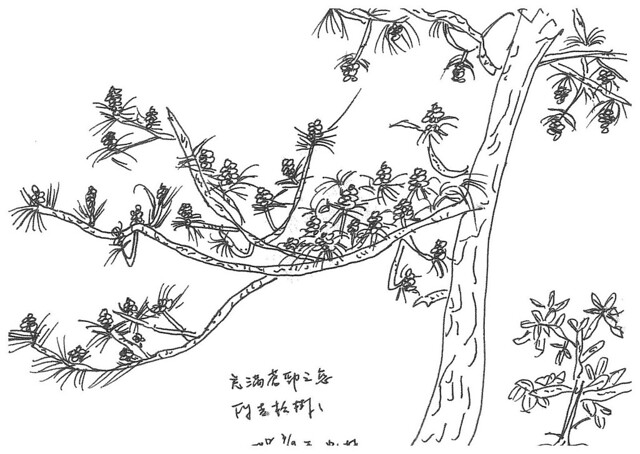 碧蘿芷(Pycnogenol)是一種法國濱海松(Pinus pinaster)的樹皮萃取物。根據11月4日出刊的「Minerva Cardioangiologica」中提及的最新研究,這種萃取物可降低將近50%的飛航乘客時差症狀(jetlag)。
碧蘿芷(Pycnogenol)是一種法國濱海松(Pinus pinaster)的樹皮萃取物。根據11月4日出刊的「Minerva Cardioangiologica」中提及的最新研究,這種萃取物可降低將近50%的飛航乘客時差症狀(jetlag)。
這個研究在義大利佩斯卡拉的G. D'Annunzio大學進行,受試對象包括133個搭飛機時間長達7-9小時的飛航旅客。受試者在上飛機前2天開始服用,每次口服50mg Pycnogenol,每天3次,持續服用7天。
這個由腦部電腦斷層(CT)掃瞄及計分系統2個部分組成的研究,顯示Pycnogenol的確可同時降低對健康者及高血壓病患的時差症狀,這些症狀包括疲勞、頭痛、失眠及腦部腫脹。乘客們也經歷非常輕微的腿部腫脹,這是長時間搭機很普遍的現象。
這個研究的主要研究者貝卡若(Gianni Belcaro)博士表示:「這個研究在此時發表,對即將到來的假期旅遊旺季來說,是再恰當不過的了。」
貝卡若將Pycnogenol極佳的效果歸因於它有使循環系統運轉地更好,及具有抗氧化效力的加成作用。
他指出:「Pycnogenol的飛航研究已經證明可以降低時差效應,而這次的研究是第一個完全針對身體反應狀況的研究。」
 Pycnogenol是一種天然的植物萃取物,由法國濱海松的樹皮衍生而來。這種松樹沿著法國西南海岸生長,也生長在西班牙、葡萄牙、義大利西部及摩洛哥北部。
Pycnogenol是一種天然的植物萃取物,由法國濱海松的樹皮衍生而來。這種松樹沿著法國西南海岸生長,也生長在西班牙、葡萄牙、義大利西部及摩洛哥北部。
在法國西南部拉斯朗德斯(Les Landes)地區廣泛種植法國濱海松,作為木材的來源,正是全球最大的人造樹林。
有關Pycnogenol的專利是用不同拉丁學名的樹種(Pinus maritima)顯示,這是Pinus pinaster已經過時的學名。
貝卡若及其他科學家表示,這種樹皮含有原花青素(Procyanidins )、生物類黃酮(Bioflavonoids)與有機酸的特殊混合成分,提供天然健康廣泛的益處。
這種萃取物已經被研究35年,並有超過220項已發表的研究。這些通過審查的的文獻已經證實將它作為一種成分的話是安全有效的。Pycnogenol已在市面上流通,加在全球超過600種的膳食補充品、多種維他命及健康產品內。
時差的正式名稱是「非同時性症狀(desynchronosis)」,它是由於飛航旅行跨越時區而引起各種不同的短暫精神及身體障礙。這種狀況常在亞洲到歐洲的飛航過程中發生,但也發生在美國東西岸間飛行的旅客。
Pycnogenol, pine bark extract from the French maritime pine tree, reduces symptoms of jetlag in airline passengers by nearly 50 percent, according to a new study published Tuesday in the journal "Minerva Cardioangiologica."
The study, conducted at the G. D'Annunzio University in Pescara, consisted of 133 passengers who took flights that were seven to nine hours in length. Fifty milligrams of oral Pycnogenol was administered three times daily, for seven days, starting two days prior to the flight.
The two-part study, consisting of a brain CT scan and a scoring system, showed Pycnogenol lowered symptoms of jetlag such as fatigue, headaches, insomnia and brain swelling in both healthy people and hypertensive patients.
Passengers also experienced minimal lower leg swelling, a common condition associated with long flights.
"This study could not have come at a better time for the upcoming holiday travel season," said Dr. Gianni Belcaro, a lead researcher of the study.
Belcaro attributes Pycnogenol's combined activities for better circulation and antioxidant potency to such remarkable results.
"Previous Pycnogenol flight studies have shown a reduction in jetlag; however this was the first study to solely focus on the condition," he said.
Pycnogenol is a natural plant extract derived from the bark of the maritime pine, Pinus pinaster, that grows along the coast of southwest France, and in Spain and Portugal, western Italy and northern Morocco.
Widely planted for timber harvest, the largest man-made forest in the world, at Les Landes in southwest France, is composed of this species.
The patents for Pycnogenol refer to the tree by a different Latin name, Pinus maritima, an obsolete synonym for Pinus pinaster.
The bark contains a unique combination of procyanidins, bioflavonoids and organic acids, which Belcaro and other scientists say offer extensive natural health benefits.
The extract has been studied for the past 35 years and more than 220 published studies and review articles have given evidence of its safety and efficacy as an ingredient.
Pycnogenol is available over the counter in more than 600 dietary supplements, multi-vitamins and health products worldwide.
Jetlag, formally called desynchronosis, causes a variety of temporary mental and physical impairments as a result of air travel across time zones - common in flights to Asia and Europe, but also observed in travelers between West and East coast.






